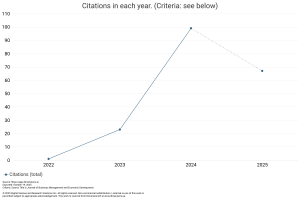Mediation Job Satisfaction: Transformational Leadership, Internal Communication and Organizational Culture to Increase Employee Engagement
DOI:
https://doi.org/10.59653/jbmed.v1i02.138Keywords:
Communication, Leadership, Organizational Culture, work engagementAbstract
This study aims to determine how much influence transformational leadership, internal communication and organizational culture have on employee engagement through job satisfaction as an intervening variable at Sijunjung Hospital. This research study uses quantitative analysis with a total sample of 11 employees. The sampling technique in this study is by census, namely the entire population is a sample of 114 employees of Sijunjung Hospital. The validity and reliability of the outer model were assessed through SmartPLS analysis, while the smartPLS inner model was used to test hypotheses. The results obtained based on the Partial Test (t test) obtained: a) there is no significant effect of transformational leadership on job satisfaction, b) there is a significant influence of internal communication on job satisfaction, c) there is a significant influence of organizational culture on job satisfaction, d) there is significant effect of transformational leadership on employee engagement, e) there is a significant effect of internal communication on employee engagement, f) significant effect of job satisfaction on employee engagement, g) job satisfaction cannot mediate the effect of transformational leadership on employee engagement, h) job satisfaction can mediate the effect internal communication on employee engagement, f) job satisfaction can mediate the influence of organizational culture on employee engagement
Downloads
References
Agung et al. (2022). Pentingnya Kepemimpinan Transformasional Dalam Keterlibatan Kerja. 2(1), 56–63.
Arianti et al. (2020). Pengaruh Faktor Kepuasan Kerja terhadap Employee Engagement di Perwiratama Group. Jurnal Manajemen Teori Dan Terapan | Journal of Theory and Applied Management, 13(1), 31. https://doi.org/10.20473/jmtt.v13i1.14889
Arif Darmawan, marlinda aulia putri. (2017). Pengaruh Gaya Kepemimpinan terhadap Komitmen Organisasi Melalui Kepuasan Kerja Sebagai Variabel Intervening. 10(April), 1–18. https://doi.org/10.15408/akt.v9i1.3581
Astari el al. (2022). Kompensasi dan Komunikasi Terhadap Kinerja Karyawan yang Dimediasi Semangat Kerja. 3(01), 31–42.
Bagis, F. (2021). Job satisfaction a mediation varaobles on the effect organizational commitmen to employee performance. Internationl Journal Of Economics, 5(2).
Bakker. (2018). Human Resource Management. New York: McGraw-Hill Education.
Ghozali. (2020). Partial Least Squares Konsep, Teknik dan Aplikasi Menggunakan Smart PLS 3.0 Untuk Penelitian Empiri. Semarang: Badan Penerbit Universitas Diponegoro.
Hair, J. F., Sarstedt, M., Hopkins, L., & Kuppelwieser, V. G. (2019). Partial least squares structural equation modeling (PLS-SEM): An emerging tool in business research. European Business Review, 26(2), 106–121. https://doi.org/10.1108/EBR-10-2013-0128
Harter. (2021). Business-unit-level relationship between employee satisfaction, employee engagement, and business outcomes: a meta-analysis. Journal of Applied Psychology, 87(2), 268.
Humairoh, H., & Wardoyo, W. (2017). Analisis Pengaruh Budaya Organisasi Terhadap Employee Engagement Dengan Kepuasan Kerja Sebagai Variabel Intervening. Jurnal Manajemen, 9(1), 1–21. https://doi.org/10.31937/manajemen.v9i1.594
Kiekas. (2019). Organisasi dan Motivasi: Dasar Peningkatan Produktivitas. Jakarta: Bumi Aksara.
Lubis, A. S., & Wulandari, S. (2018). Pengaruh Employee Engagement Dan Kepemimpinan Terhadap Kinerja Pegawai Pada Dinas Pariwisata, Budaya, Pemuda Dan Olah Raga Kabupaten Serdang Bedagai. Jurnal Manajemen Dan Keuangan, 7(1), 82–89. https://doi.org/10.33059/jmk.v7i1.749
Lutfi. (2022). Factors that Affect Employee Engagement in The Workplace. Management Analysis Journal, 3(1).
Mon. (2022). The Effect Of Transformasional Leadrship On Employee Engagement As A Mediation Variable. Journal of Business Studies and Management Review (JBSMR), 5(1).
Murniasih. (2021). Komitmen Afektif dalam Organisasi yang Dipengaruhi Perceived Organizational Support dan Kepuasan Kerja. Jurnal Aplikasi Manajemen, 10(2).
Ningrum el al. (2017). Pengaruh Komunikasi Internal dan Imbalan terhadap Employee Engagement. 930–935.
Nuryahman. (2022). Pengaruh Keadilan Organisasi dan Karakteristik Pekerjaan Terhadap Keterikatan Karyawan Dengan Kepuasan Kerja Sebagai Variabel Intervening Kantor Pelayanan Pajak Pratama Jambi Telainapura. Jurnal ManajemenTerapan Dan Keuangan (Mankeu), 10(3).
Piedade. (2022). The Influence of Transformational Leadership on Employee Performance Through Work Climate and Organizational Commitment. Timor-Leste Journal of Business and Management, 3(1).
Prayekti, P., & Pangestu, K. A. (2022). Pengaruh Kepemimpinan Transformasional, Lingkungan Kerja, dan Kompensasi Terhadap Kepuasan Kerja Karyawan PT BPR BKK Kebumen (PERSERODA). JENIUS (Jurnal Ilmiah Manajemen Sumber Daya Manusia), 5(2), 373. https://doi.org/10.32493/jjsdm.v5i2.16515
Priyatmo, C. L. (2018). Pengaruh Kepemimpinan Transformasional Terhadap Kinerja Karyawan Dengan Mediasi Kepuasan Kerja. Jurnal Ekonomi, 9(1), 13–21.
Ramadhi, & Amri, A. (2021). Mediasi Kepuasan Kerja: Komunikasi, Kimitmen dan Disiplin Kerja Serta Dampaknya Pada Kinerja Karyawan (Studi Kasus Pada Radio Republik Indonesia (RRI) Padang). Strategic: Journal of Management Sciences, 1(3), 94–112.
Robbins, P. S. dan T. A. J. (2017). Perilaku Organisasi. Salemba Empat. Jakarta.
Rohman, A. F., Indiyati, D., & Ghina, A. (2021). The Influence of Organizational Culture and Employee Engagement on Employees Performance at Telkom University, Indonesia. International Journal of Science and Society, 3(1), 75–88. https://doi.org/10.54783/ijsoc.v3i1.268
Sahertian. (2020). Konsep Dasar & Teknik Supervisi Pendidikan dalam rangka pengembangan sumerdaya manusia. Jakarta: Rineka Cipta.
Saparani. (2022). The Influence of Employee Engagement and Organizational Culture on Employee Performance through Job Satisfaction. Business and Management, 3(1).
Schaufeli. (2019). The Differences Between Work Engangement and Workaholism. USA and UK: Edward Elgard Publishing.
Schein. (2018). Organizational Culture and Leadership. San Fransico: Josey-Bass Publishers.
Sugiyono. (2019). Metode Penelitian kuantitatif kualitatif dan R&D (2019th ed.). Bekasi: Alfabeta.
Sukmarani. (2022). Pengaruh Usia Dalam Kepemimpinan Transformasional dan Keterikatan Kerja Pada Perusahaan. Journal of Management and Bussines (JOMB), 4(1).
Sunyoto. (2018). Manajemen Sumber Daya Manusia. Jakarta: Buku Seru.
Suranto. (2019). Komunikasi Interpersonal. Yogyakarta: Graha Ilmu.
Syahrial. (2022). Analisis Pengaruh Kualitas Kehidupan Kerja Terhadap Keterikatan Pegawai di Dinas Pekerjaan Umum dan Penataan Ruang Kabupaten Deli Serdang. Jurnal Penelitian, 15(4).
Tafsir et al. (2022). Artikel info Artikel history: Submission. Jurnal Sosio Sains, 8(1), 30–42.
Williantara. (2022). Pengaruh Budaya Organisasi Terhadap Kinerja Karyawan Dengan Kepuasan Sebagai Variabel Mediasi Pada CV. Ciptama Computer Di Denpasar. Jurnal Widya Amrita, 2(1).
Wiratama. (2022). Budaya Organisasi Sebagai Variabel Mediasi Terhadap Keterikatan Karyawab PT. Bhumi Phala Perkasa. Jurnal Manajemen Bisnis, 10(1).
Yukl. (2019). Leadership In Organizations. Jakarta: Indeks.
Zahreni, S., Simarmata, R., & Nainggolan, Y. (2021). Pengaruh Budaya Organisasi terhadap Keterikatan Kerja dan Organizational Citizenship Behavior (OCB). Analitika: Jurnal Magister Psikologi UMA, 13(1), 34–43.
Downloads
Published
How to Cite
Issue
Section
License
Copyright (c) 2023 Ramadhi Ramadhi, Kiki Sarianti, Yolanda Desti

This work is licensed under a Creative Commons Attribution-ShareAlike 4.0 International License.
Authors who publish with this journal agree to the following terms:
- Authors retain copyright and grant the journal right of first publication with the work simultaneously licensed under a Creative Commons Attribution-ShareAlike that allows others to share the work with an acknowledgement of the work's authorship and initial publication in this journal.
- Authors are able to enter into separate, additional contractual arrangements for the non-exclusive distribution of the journal's published version of the work (e.g., post it to an institutional repository or publish it in a book), with an acknowledgement of its initial publication in this journal.
- Authors are permitted and encouraged to post their work online (e.g., in institutional repositories or on their website) prior to and during the submission process, as it can lead to productive exchanges, as well as earlier and greater citation of published work (See The Effect of Open Access).





























